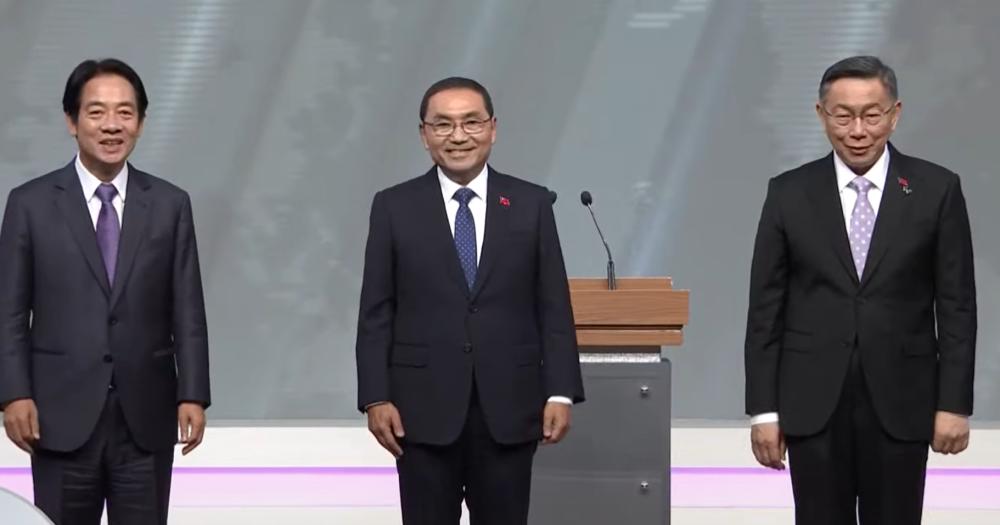The final election polling for Taiwan's Jan. 13 presidential election shows the Democratic Progressive Party's (DPP) candidate, incumbent Vice President William Lai Ching-te, retaining his lead over his two opponents.
Close run thing
According to Bloomberg, the DPP's Lai maintains a clear polling lead going into the final 10 days of the campaign.
However, his closest opponent, the Kuomintang's (KMT) Hou Yu-ih is close behind him in several of the most recent polls.
Maintaining the third placed position is the Taiwan People's Party (TPP) Ko Wen-je.
Taiwan has a 10-day polling blackout period immediately prior to the elections, meaning that after Jan. 2, no more elections polls will be published.
Any changes in support for candidates will only be known after the election.
Bloomberg quoted three different polls, My Formosa, TVBS Poll centre, and Taiwan Public Opinion Foundation.
All three show consistent rankings between the three candidates, but with significantly different margins.
The My Formosa poll showed Lai significantly ahead of Hou, who himself was significantly ahead of Ko.
However, the TVBS poll showed Lai and Hou neck and neck, with Ko significantly behind the pair.
The final Taiwan Public Opinion Foundation poll showed the three candidates to be within touching distance of each other.
Polling methodology
Other outlets such as the Taiwan Times also showed Lai in the lead.
The Taiwan Times used a consolidated poll of polls to come to its conclusion, but noted that the poll of polls relied on traditional polling methods, which contacted prospective voters using landline telephones, which were relatively rare amongst younger voters.
The Taiwan Times poll of polls did not use polls using significantly different polling methodologies, such as targeting mobile users or social media, but its report did cite them, noting they had significantly different results.
One such poll was the TPP’s own internal polls, which showed Ko in second place and with a decent chance of winning.
While a majority of polls that the Taiwan Times looked at showed the Lai-Hou-Ko ranking, a significant number that showed Ko with a chance of victory because 10% (numbers vary depending on poll) of voters were undecided, and the possibility that voters might choose to abandon their preferred candidate in order to vote tactically.
Ko’s supporters believing they had a chance of victory meant that they were likely to hold firm come polling day, and not abandon him for either Lai or Hou and might even be able to attract wavering voters.
Ultimately, no candidate looks likely to win an outright majority.
However, as Taiwan's election is conducted using first-past-the-post voting, the victor only needs more votes than his next nearest competitor.
Geopolitical implications
English-language media has understandably focused on Taiwan-China relations, with China constantly saying that it might resort to force in order to achieve reunification with what it sees as a “rogue province”.
On December 31, the three candidates met for a televised debate where the topic of cross strait relations was front and centre.
The Associated Press reported all three candidates expressing desire for peaceful relations with Beijing, but each differed on how they framed it.
Lai, who is the incumbent vice president under Tsai Ing-wen, was quoted as saying “as long as there is equality and dignity on both sides of the Taiwan strait, Taiwan’s door will always be open”.
He added that he would always be willing to conduct exchanges and cooperation with China if it enhanced the well-being of people on both sides of the Taiwan Strait.
Hou, part of the traditionally pro-reunification KMT, said that he opposed Taiwanese independence.
But he also opposed unification under China's “one country, two systems” framework, which has been applied to Hong Kong since it returned to China in 1997, saying that he favoured democracy and freedom for Taiwan.
Ko emphasised the shared history, language, religion, and culture of mainland and Taiwan, but said that they now had a different political system and way of life.
Ko said that dialogue between Taiwan and China could only occur if Taiwan could maintain its current democratic political system and way of life.
China has been accused of trying to influence the election, with its President Xi Jinping saying in his New Year’s address that Taiwan and China’s reunification was “inevitable”.
Related stories
Top image via Taiwanplus/YouTube

If you like what you read, follow us on Facebook, Instagram, Twitter and Telegram to get the latest updates.



